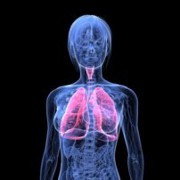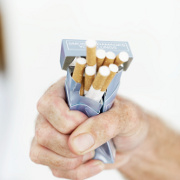 Photo: Getty Images
Photo: Getty Images
One of the most common lung diseases is emphysema. According to the National Emphysema Foundation ʺan estimated 3.1 million Americans have been diagnosed with emphysema.ʺ The American Lung Association claims more than 94 percent of patients diagnosed with emphysema are 45 years or older.
Emphysema is one form of chronic obstructive airways disease (COPD). Emphysema was known as the smoking man’s disease. But, recently women are being diagnosed more than men. Some research has shown women’s lungs are more sensitive than men’s lungs.
If you have emphysema, damage to your lungs is irreversible. According to the Centers for Disease Control (CDC), emphysema causes the walls between the air sacs in the lungs to lose their ability to stretch and shrink back. Over time, the air your breath becomes trapped in the lungs because of your air sacs are weakened and damaged.
Risk factors of emphysema include the following:
• Smoking
• Exposure to heavy amounts of pollution
• Exposure to heavy amounts of secondhand smoke
• Exposure to certain gases or fumes in the workplace
• Frequent use of cooking fire without proper ventilation
According to the U.S. National Library of Medicine (NLM), ʺbecause the symptoms of COPD develop slowly, some people may not know that they are sick.ʺ The NLM states symptoms of emphysema include:
• Wheezing
• Cough, with or without mucus
• Shortness of breath (dyspnea)
• Limited exercise tolerance (breathing gets worse with mild activity)
• Trouble catching one's breath
• Fatigue
• Many respiratory infections
The Harvard Medical School states emphysema ʺcan be diagnosed by breathing tests and computed tomography (CT or CAT) scanning.ʺ
There is no cure for emphysema. However, your symptoms can be managed with exercise and medications. The NLM states the types of medications may include the following:
• Antibiotics
• Inhalers
• Anti-inflammatory medications
• Inhaled steroids
• Oxygen therapy
• Steroids by mouth or through a vein
• Bronchodilators through a nebulizer
• Assistance during breathing from a machine
Walking can improve your condition as well as strengthen your legs. And, a healthy diet will benefit your health long term.
Also, the NLM recommends the following to improve conditions in and around your house. Those things include:
• Reducing air pollution by getting rid of fireplace smoke and other irritants
• Avoiding very cold air
• Making sure no one smokes in your home
• Avoiding smoky areas
If you or your loved one has emphysema and you are looking for a support group, try the Better Breathers Club. The clubs meet on a regular basis and discuss topics related to COPD.
To find a Better Breathers Club in your area, go to
http://www.lungusa.org/lung-disease/copd/connect-with-others/better-breathers-clubs/.
Sources:
About Us. Welcome to the National Emphysema Foundation. Retrieved October 2, 2011, from
http://www.emphysemafoundation.org/about-us.html
COPD FAQ. Harvard Medical School. Retrieved October 2, 2011, from http://www.intelihealth.com/IH/ihtPrint/E/32172/32173/352875.html?d=dmtContent&hide=t&k=basePrint
Chronic Obstructive Pulmonary Disease (COPD) Fact Sheet - American Lung Association. Homepage - American Lung Association. Retrieved October 2, 2011, from
http://www.lungusa.org/lung-disease/copd/resources/facts-figures/COPD-Fact-Sheet.html
Chronic obstructive pulmonary disease - PubMed Health. National Center for Biotechnology Information. Retrieved October 2, 2011, from http://www.ncbi.nlm.nih.gov/pubmedhealth/PMH0001153
Emphysema - American Lung Association. Homepage - American Lung Association. Retrieved October 2, 2011, from http://www.lungusa.org/lung-disease/emphysema
GRADY, D. Emphysema - Symptoms, Diagnosis, Treatment of Emphysema - NY Times Health Information. Health News - The New York Times. Retrieved October 2, 2011, from http://health.nytimes.com/health/guides/disease/emphysema/overview.html
Preventing COPD - American Lung Association. Homepage - American Lung Association. Retrieved October 2, 2011, from http://www.lungusa.org/lung-disease/copd/about-copd/preventing-copd.html
Respiratory Disease. Centers for Disease Control. Retrieved October 2, 2011, from www.cdc.gov/tobacco/data_statistics/sgr/2010/highlight_sheets/pdfs/overview_respiratory.pdf
Reviewed October 3, 2011
by Michele Blacksberg RN
Edited by Jody Smith



Add a CommentComments
There are no comments yet. Be the first one and get the conversation started!